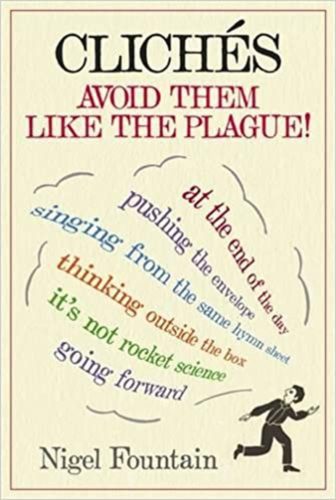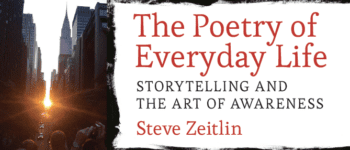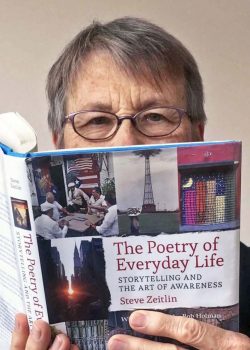Poetry of Everyday Life Blogpost #23
Produced in collaboration with Voices: Journal of New York Folklore

“If you want to be a writer,” my high school English teacher taught, “avoid clichés like the plague,” using one herself to make the point. Clichés, though once original phrasings, are expressions that have become overused over time. A website, “The Editor’s Blog: It’s All About the Words,” suggests that using clichés like She’s cute as a button and I’ve painted myself into a corner is “like wearing someone else’s old and dirty clothes. They might have looked good at one time, but they don’t look good anymore.”

But clichés are also part of the poetry of everyday life. When my close friend Carol Reuben starts conversations with “What’s the story, morning glory?” and ends them with “Okey-dokey, artichokey,” she is not only using rhymed clichés; she is expressing her characteristic playfulness. Some people even use silly clichés to create others: Toodle-oo, Kangaroo; Take care, Polar Bear; Keep on Talking, Steven Hawking; See Ya, wouldn’t want to Be Ya. When Lucas Dargan, my late father-in-law, said, “Better to remain silent and be thought a fool than to speak and remove all doubt,” the timeworn phrase nevertheless captures his thoughtful, succinct, and sparing use of words. He had made it his own.
Cliché was the French word for “stereotype,” but its current use is said to come from the jargon of French printers. To save time, French printers would place frequently used phrases in one block, ready to be set among the individual letters. The French verb clicher, meaning “to click,” imitates the sound the letters made when striking metal to create the printing plates. Through onomatopoeia, cliché came to mean “a ready-made, often-used phrase,” and was so useful that it migrated into English. Of course, “overuse” is subjective. Each of us has heard these phrases repeated a different number of times, so what is or is not a cliché is always arguable.
Each word in the English language has its own etymology, its own history. Many come from simple sounds for natural elements or body parts—such as head, foot, and heart—that over time are combined into metaphors that express concepts: the head of the class, the foot of the bed, the heart of the matter. In Middle English and Old Norse “window” originally meant “eye of the wind.” In his 1844 essay “The Poet,” Ralph Waldo Emerson wrote, “The etymologist finds the deadest word to have been once a brilliant picture. Language is fossil poetry. As the limestone of the continent consists of infinite masses of the shells of animalcules, so language is made up of images, or tropes, which now, in their secondary use, have long ceased to remind us of their poetic origin.” In a sense, every word is a poem.
Clichéd phrases are too. They are a kind of a tripartite metaphor – the first layer is the image itself; the second the situations to which it often applies; and the third the way a given person utilizes the analogy to apply to a given situation in a conversation or on the page. Folklorists sometimes refer to clichés and proverbs as “the social use of metaphor.” Whether or not a phrase is a cliché depends on how you use it.
Anyone who loves language should appreciate the handed-down poetry of the cliché. I once called a program officer of a granting agency to ask if City Lore could apply for two different projects in a single proposal. In keeping with his background, he answered with a Southern saying: “If you try to catch two rabbits, you may not catch either one.” This conversation led me to imagine the following conversation between myself and Molly Garfinkel, City Lore’s Codirector:
“How do we know if we’ll get the grant?” Molly asks.
“We’re out there on a wing and a prayer,” I reply. “We’ll have to take that leap of faith.”
“Well, why don’t we call the program officer to ask about where it stands?” Molly says. “You know, the squeaky wheel gets the grease.”
“Well, we don’t want to bite off our nose to spite our face,” I say.
“‘I see,’ said the blind man,” Molly responds. “Good point.”
I reply, “Yeah, I guess in this line of work, if you can’t take the heat, get out of the kitchen.”
Each of these phrases paints a vivid word picture—created by Anonymous—that explains their enduring charm. Many phrases that are now clichés are poems unto themselves:
baptism by fire kiss of death Heavens to Betsy wild goose chase
on a shoestring the apple doesn’t fall far from the tree raining cats and dogs
water off a duck’s back once in a blue moon throwing caution to the wind
when hell freezes over the leopard cannot change its spots going to hell in a wheelbarrow
water under the bridge it comes with the territory thank God for small favors
there is a God absence makes the heart grow fonder. youth is wasted on the young
It’s not the age, it’s the mileage the living end
Many are perfect, satisfying metaphors, such as the Morton Salt slogan: When it rains, it pours, also used for a string of bad news. Some can be turned around or built upon. After a New York City arts council tried to justify a dramatic change in direction that demoralized its constituents, its director encouraged them with the phrase “There’s light at the end of the tunnel,” to which Trinidadian artist Michael Manswell replied, “It’s hard to see the light at the end of the tunnel when there’s a bend in the road.”
When my wife and I asked Burl Godwin, who was building a driveway on my wife’s family farm, a question for which he had no response, he replied: “I have no idea. I didn’t take that girl to the dance,” meaning: “That’s not my area of expertise.” When I asked him to explain the origin of the phrase, he said, “You should only dance with the girl you brought to the dance. If you try to dance with all of them, you might come home with none at all”: some wry wisdom, he suggested, for anyone—like us at City Lore—who may be juggling too many projects.
Master poets and songwriters use clichés as well. Even Shakespeare in The Merry Wives of Windsor (1602) uses like the dickens. The word dickens had nothing to do with Charles Dickens (who was not yet born at the time), but was a synonym for the devil.
I once read that Bob Dylan, who won the Nobel Prize in Literature in 2016, “approaches a cliché the way a butcher approaches a salami.” Some of his deeply moving lines seem to have their origin in daily phraseology: “Most likely you go your way (and I’ll go mine)”; “Don’t think twice it’s all right.” Singer-songwriter Tom Paxton draws on a cliché for his masterful song “The Last Thing on My Mind.”
In an onstage introduction to his wonderful, quirky song “It’s a Big Old Goofy World,” the late John Prine said, “This poem I got the idea for when I was helping my mom finish her crossword puzzle. About a year ago, on the back of the crossword puzzle book, there was this deal where you fill in the blanks of a whole bunch of similes, like sly as a fox, busy as a bee, and we got to laughing about them. . . . So I carried this idea around for a year, collecting these similes.” With them, he created his lyric, which ends, “So I’m sitting in a hotel / trying to write a song. / My head is just as empty / as the day is long. / Why it’s clear as a bell: / I should have gone to school. / I’d be wise as an owl / ’stead of stubborn as a mule.”
The singer songwriter Tom Waits took the great cliché That’s the way the cookie crumbles and created the lyrics, “That’s the way the pan flashes. / That’s the way the market crashes. / That’s the way the whip lashes. /That’s the way the teeth gnashes. / That’s the way the gravy stains. / That’s the way the moon wanes.”
Most of us are not capable of such masterful turns of phrase. However, as we become more intimate with one another, our conversations are often shift from prose toward poetry. A friend of mine, Solomon Reuben, put it this way: “Heartful sharing becomes artful sharing.” We condense our stories into brief phrases that sum up a story we know our friends and family will recognize. We begin to use catchwords and allusions, and much of our conversation is laden with these associations. Because of this, close families and friends often seem to be in sync. Without missing a beat, they can interject a teasing family expression that brings back a rush of memories. The better we know and love someone, the more layered and poetic our conversation becomes. As another friend, Gingy Caswell, said about her relationship with her sister: “We refined out communication into a work of art.” Employed with irony and humor, clichés can help us do the same.
Not long ago, during a game of pickleball, I ran for a shot that nicked the net but didn’t go over but rolled back on my side. Ann Regan, one of my opponents, said teasingly, “Close, but no cigar, as they say.” Playfully, I retorted, “Fuck you”—but then to soften it I added, “as they say.” She burst out laughing. Writing teachers will tell you that as they say weakens any sentence—it’s a phrase often used as a cliché to introduce other clichés. Since the day I made that comment, Ann and I pause after any sarcastic retort, then add as they say. We have created our personal use for a phrase that not only evokes the original incident but means something different to us than it does to the rest of the world: it has become part of what the writer Virginia Randall calls “The language of us. The deepest meanings are often hidden in the silliest things.
In another Pickleball game, a friend who often misses her backhand shots, hit a perfect shot right down the line to clinch a game. “How did you manage to do that I asked?” “A broken clock is right twice a day,” she answered.
So at the end of the day, when all is said and done (to coin a phrase), I would say this about clichés: Don’t touch them with a ten-foot pole! But, then again, Never say never. Contrary to popular belief, Clichés can be a source of wisdom, humor, and joy in language—some are so good they bear repeating. Rules are made to be broken: make them your own; appreciate their poetics; twist them around; don’t believe everything your English teacher says; and don’t miss out on the poetry of everyday life.







12 thoughts on “On a Wing and a Prayer: Finding Poetry in the Cliche”
It Looks good, Steve. Congratulations!
What a wonderful essay, Steve! In my family, we use the punchlines of jokes as cliches. Especially the ones my late, much-missed father used to tell. They’re often about immigrant Jews and they give us a warm family feeling. Here’s one for you: Abe and Saul retire from the garment business after 40 years. They go to the Amazon jungle on a retirement trip together. They’re having a great time when Abe feels something land on his back. He shouts “Saul, what’s on my back?” Saul looks and shrugs. Abe yells, “Saul, there’s something on my back, what is it?” And Saul shrugs again. Abe says “For the love of god, we were partners for 40 years, what is on my back?” And Saul says, “How should I know, am I a furrier?” So the family saying goes, “Am I a furrier?” meaning, this is not my area of expertise, I wouldn’t venture to guess, don’t drag me in. There are so many more.
P.S. I should say that Steve and I are, not as far as we know, related, though we sometimes tease each other when the other one has done or said something especially good, “See, you probably are my cousin after all!”
Love this latest posting, Steve! Was sharing excerpts from it out loud with wife Gini, whoI did bring to the dance with.
Wonderfully done. You did catch two rabbits here!
What I meant to write correctly above was this:
Love this latest posting, Steve! Was sharing excerpts from it out loud with wife Gini, who I did bring to the dance!
Bravo Steve! A great read. Shall we call it “thinking outside the box”? Seriously, this helps in making decisions as I write Frisner’s bio. I also find the history of the word “cliché” fascinating. Thank you for a thoughtful and fun blog post.
Wonderful post, Steve. Once again, humorous & erudite, enjoyable & informative.
Glad I came to the dance with you.
Don’t know about 2 birds in a bush, but you definitely caught both those rabbits!
I’m as pleased as punch to read this, Steve. one person’s cliche is another person’s tradition…
Love the way you find language enriched, even when it has supposedly been impoverished. Those personally coded clichés you discuss feature in many of our lives, and do the fun work of universals individualized.
Kathleen — thanks for your beautiful insights!!!
That was as good as it gets,
As American as apple pie…😂
Carolyn Wells
I really enjoyed reading your blog. I have known a version of the expression, that you have to dance with them that brung you. I
I loved that you cited Dylan, Tom Waits, John Prine (we are still missing him!). I recalled how years ago when I used to play my Dylan records (loudly) in my bedroom, I drew angry calls from my parents to turn my music down, but once I asked my mother into my lair, as I thought she might be a bit more open-minded than my dad, to listen to Dylan’s lyrics. Her response was that he’d never be recognized as a great writer, because he used too many cliches! Dementia had already overtaken her by 2016 when he received the Nobel Prize in Literature, so she could never know that she underestimated him.
When John Prine died, I asked my daughter if she remembered him – she grew up with our music and folk festivals were family vacations – but she was blanking on who he was. I reminded her of the “body parts song” (Please Don’t Bury Me) and she immediately returned with “Send my mouth way down south/And kiss my ass goodbye”. I think we use song lyrics, however cliched, like you note with cliches in general, as shorthand among friends and family – I loved your writing on that form of communication. When I am feeling anxiety, my mantra becomes “Excuse me while I kiss the sky” and I resort to Elvis C. when I feel ageism coming my way: “The angels want to wear my red shoes.”
I was wondering when I read your retort to your friend and pickleball player if we were the same age, or could I be younger than you, because I wouldn’t have thought the need to soften the retort, but I loved the story. Funny, that when we were young, we thought we invented the f word and all its manifestations, including especially its maternal version. It challenged the arrogance of youth, to realize though how old this one was, a word of warfare in the times of Anglo Saxon castles and moats and walls surrounding them, walls that had to be penetrated for the fighting to get underway, hence, to fuck a fortress. And, as they say, “all’s fair in love and war.”
~Patti Mason